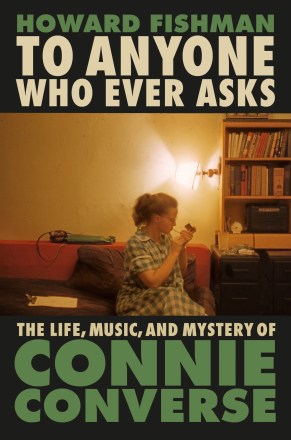Virtual Memories Show 548:
Howard Fishman
Podcast: Play in new window | Download
Subscribe: Spotify | TuneIn | RSS | More
“It’s incredible to me how close Connie Converse and all she did came to completely vanishing from the face of the earth.”
 Writer, musician and composer Howard Fishman joins the show to celebrate his amazing new book, TO ANYONE WHO EVER ASKS: The Life, Music and Mystery of Connie Converse (Dutton). We get into how he discovered the music of the enigmatic Connie Converse, when he realized her life was a rabbit hole that would take more than a decade to delve through, what it was like to write a biography around the gaps in her life, and the sheer amount of chance, happenstance, and miraculous occurrences that led to this book. We talk about how Connie Converse arose as a singer-songwriter in 1950s NYC (maybe) just a few years ahead of her time, her subsequent role as a public intellectual and progressive activist, her Cassandra-like nature, the analytical mind she brought to music, policy, and every other topic in her life, and how she vanished without a trace in the mid-’70s. We also discuss his time as a research assistant for NYT editor Arthur Gelb, how his idea of artistic legacy changed in light of learning Connie Converse’s story, the relationship between artist and audience (and the Cat Stevens story that first brought him to my attention), what it means to renounce one’s art, how he tried to do justice to the Connie Converse story, and a lot more. Give it a listen! And go read TO ANYONE WHO EVER ASKS!
Writer, musician and composer Howard Fishman joins the show to celebrate his amazing new book, TO ANYONE WHO EVER ASKS: The Life, Music and Mystery of Connie Converse (Dutton). We get into how he discovered the music of the enigmatic Connie Converse, when he realized her life was a rabbit hole that would take more than a decade to delve through, what it was like to write a biography around the gaps in her life, and the sheer amount of chance, happenstance, and miraculous occurrences that led to this book. We talk about how Connie Converse arose as a singer-songwriter in 1950s NYC (maybe) just a few years ahead of her time, her subsequent role as a public intellectual and progressive activist, her Cassandra-like nature, the analytical mind she brought to music, policy, and every other topic in her life, and how she vanished without a trace in the mid-’70s. We also discuss his time as a research assistant for NYT editor Arthur Gelb, how his idea of artistic legacy changed in light of learning Connie Converse’s story, the relationship between artist and audience (and the Cat Stevens story that first brought him to my attention), what it means to renounce one’s art, how he tried to do justice to the Connie Converse story, and a lot more. Give it a listen! And go read TO ANYONE WHO EVER ASKS!
“She really was a Cassandra, in terms of being able to see the future and no one being able to understand what she was saying.”
“When I first heard her music, it was the crystallization of everything I wanted to do as a songwriter and as a musician, except she was much better.”
“For some people, posting is about getting likes and clicks and repostings, and fame & fortune; I don’t think that’s what people like Connie Converse are after when they express themselves through art.”
“The work has to be its own reward, whether or not it outlasts us, or reaches a huge audience. It has to be enough, that we make it.”
Enjoy the conversation! Then check out the archives for more great episodes!
Lots of ways to follow The Virtual Memories Show! iTunes, Spotify, Twitter, Instagram, YouTube, TuneIn, Tumblr, and RSS!
About our Guest
Howard Fishman is a frequent contributor to The New Yorker, where he has published essays on music, film, theater, literature, travel, and culture. His bylines have also appeared in the New York Times, Rolling Stone, The Telegraph, Vanity Fair, The Washington Post, Artforum, San Francisco Chronicle, Mojo, The Village Voice, Jazziz, and Salmagundi. His play, A Star Has Burnt My Eye, was a New York Times “Critics Pick.” As a performing songwriter and bandleader, he has toured internationally as a headlining artist for over two decades. He has released eleven albums to date, and is the producer of the album Connie’s Piano Songs: The Art Songs of Elizabeth “Connie” Converse. He is based in Brooklyn, NY.
Follow Howard on Twitter, Instagram, YouTube, and Bandcamp.
Credits: This episode’s music is Fella by Hal Mayforth, used with permission from the artist. The conversation was recorded remotely via Zencastr. I used a Heil PR-40 Dynamic Studio Recording Microphone feeding into a Zoom PodTrak P4. All processing and editing done in Adobe Audition CC. Photo of Howard by David Doobinin. It’s on my instagram.


